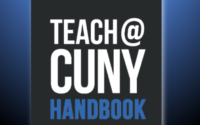
Creating and Collaborating: Students’ and Tutors’ Perceptions of an Online Group Project
Although collaboration skills are highly valued by employers, convincing students that collaborative learning activities are worthwhile, and ensuring that the experience is both useful and enjoyable, are significant challenges for educators. This paper addresses these challenges by exploring students’ and tutors’ experiences of a group project where part-time distance learners collaborate online to create a […]














